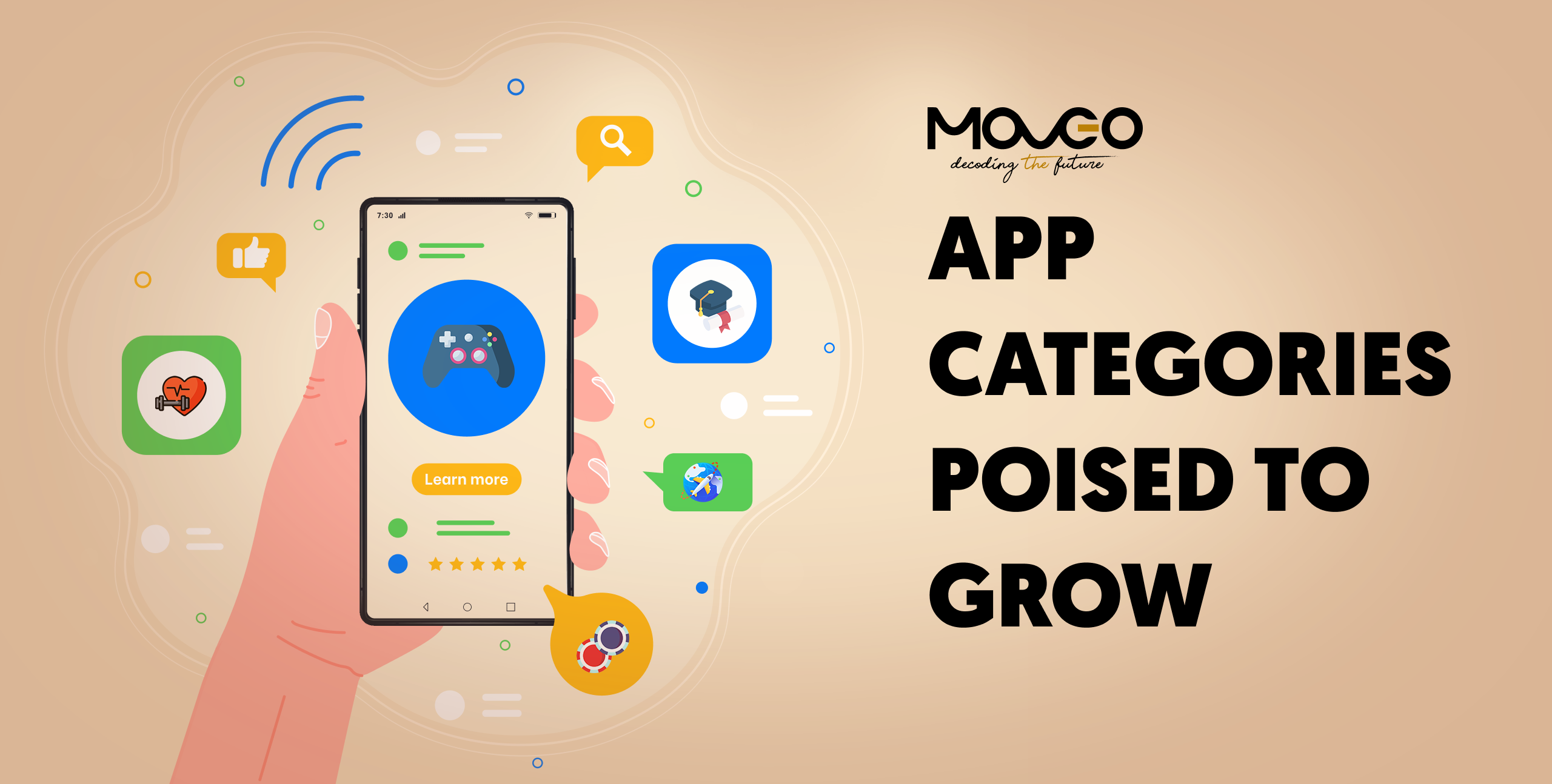Having an app is no longer a luxury or an add-on—it’s an absolute necessity. Apps have become the cornerstone of modern business strategy, bridging the gap between companies and their customers. They provide convenience, accessibility, and engagement that traditional methods simply can’t match.
142.6 billion apps and games were downloaded in 2022.
However, not all apps are created equal. Understanding the dynamics of various app categories can set you apart in this crowded marketplace. It’s no longer just about having an app; it’s about having the right app in the right app category.
Let’s journey through the ever-shifting terrain of app categories, shedding light on the trends that are not only shaping the present but also influencing the future of digital business. With a firm handle on how different app categories work, entrepreneurs and developers can make informed decisions, identify untapped opportunities, and make more money with apps. Sustained success in the app ecosystem comes from strategic planning and thorough understanding of industry trends. Join us as we explore the top trending app categories that are redefining industries and setting the stage for innovation and growth.
-
Gaming
Gaming apps have been a dominant force for years, and there’s no sign of them slowing down. New age gaming apps are transforming not only how we play but also how we interact with the world.
Games like “Fortnite” have evolved into virtual hangout spaces where friends can connect, chat, and enjoy shared experiences. Even non-gamers are drawn to these digital experiences thanks to their social potential.
In 2024 and beyond, AR and VR are set to take gaming to new heights. Imagine a game that transforms your living room into a battlefield or an AR app that lets you recreate historical battles in your neighbourhood park.
These technologies promise to blur the lines between the digital and physical worlds, creating a new era of immersive entertainment.
-
Health & Fitness
The global health and fitness app market is experiencing remarkable growth, and this trend is poised to continue. These apps have become personalized wellness coaches.
Apps like MyFitnessPal and HealthifyMe not only track your workouts and diet but also offer insights and recommendations based on your goals and progress. They make healthy living accessible to all, regardless of location or budget.
Apps like Cultfit and Classpass have even brought about entirely new models for fitness classes, where users instead of being committed to one predesigned workout plan, get to try out new classes and innovative workouts.
The importance of mental health has gained widespread recognition, and mental health apps like Calm and Headspace offer mindfulness and meditation techniques to manage stress and anxiety. These apps provide accessible tools for improving mental well-being, making mental healthcare more approachable and destigmatized.
This shift in healthcare delivery is likely to continue, making healthcare more accessible and convenient for millions. Mobile healthcare apps will continue to play a pivotal role in this revolution and forever be a growing app category.
-
Medical and Tele-Health Apps
Medical and telehealth apps have emerged as lifelines, and are poised to remain indispensable in 2024 and beyond. Integration of AI and machine learning in medical apps is only going to make healthcare apps even more effective and widespread, enabling more accurate diagnoses and personalized treatment plans.
Telehealth apps like Teladoc and Doctor On Demand have enabled patients to consult with healthcare professionals from the comfort of their homes reducing the burden on healthcare facilities and providing a safer and more accessible way to receive medical advice and prescriptions.
Apps like Apple Health and Fitbit are turning smartphones and wearable devices into personal health assistants tracking vital signs, such as heart rate and blood pressure, and help users manage chronic conditions like diabetes.
Medication management apps like Medisafe and MyTherapy make it easier to adhere to medication schedules, improving outcomes for patients.
Apps that store and organize patient records and report make the tertiary healthcare services immensely hassle free.
As regulations evolve to accommodate telehealth, healthcare apps will continue to bridge gaps in healthcare access, providing a more patient-centric and inclusive approach to medical care.
-
E-Commerce
E-commerce apps have become the backbone of modern retail, offering unparalleled convenience and an extensive range of products at our fingertips.
E-commerce giants like Amazon, eBay, and Alibaba have eliminated physical boundaries, shipping their wares all over the world. They employ advanced algorithms to suggest products based on your preferences and purchase history, creating a tailored shopping experience that’s uncannily intuitive.
AR and Virtual Try-Ons are revolutionizing the way we shop for clothing, accessories, and even furniture. Apps like IKEA Place enable users to visualize how products will look in their homes before making a purchase. Virtual try-on features for clothing and cosmetics are remarkably sophisticated, reducing the guesswork of online shopping.
Grocery delivery apps like Instacart, Shipt, and Amazon Fresh have not only streamlined the weekly grocery run but also ensured that essential items are just a few clicks away.
Whether you’re looking for unique handmade crafts from local artisans or specialty goods from distant countries, e-commerce apps connect you with a global marketplace.
In 2024 and beyond, e-commerce apps will continue to enhance user experiences with innovative features such as faster delivery, AR showrooms, and AI enhancements. From everyday essentials to rare collectibles, e-commerce apps are your passport to a world of endless possibilities.
-
Finance & Fintech
The finance and fintech sector is seeing a massive digital transformation, as apps are democratizing finance, redefining how we manage, invest, and transact with our money. Banking apps have made traditional brick-and-mortar branches seem outdated. With just a few taps, users can check balances, pay bills, transfer funds, and even deposit checks.
Investment apps like Robinhood and E*TRADE have democratized investing by allowing users to buy and sell stocks, cryptocurrencies, and other assets with minimal fees. These apps have made investing accessible to a wider range of people, breaking down barriers and expanding financial literacy.
Cryptocurrency exchanges like Coinbase and Binance have played a pivotal role in the mainstream adoption of cryptocurrencies like Bitcoin and Ethereum. As cryptocurrencies continue to gain acceptance, these apps are at the forefront of the digital currency revolution, enabling users to buy, sell, and manage their crypto holdings.
Apps like Mint and YNAB (You Need a Budget) have simplified personal finance management. They help users budget, track expenses, and set financial goals. AI-driven financial assistants provide insights and recommendations to improve financial well-being.
The adoption of digital wallets and contactless payment apps like Apple Pay, Google Pay, and Samsung Pay has accelerated, allowing users to make secure payments with their smartphones, reducing the need for physical cash and cards.
In 2024, we can anticipate further innovation in the fintech space. AI-driven robo-advisors will continue to offer personalized investment strategies, while blockchain technology may disrupt traditional banking services.
-
Education
Education apps have ushered in a new era of learning, making knowledge accessible to individuals of all ages, backgrounds, and locations. As traditional education systems evolve, these apps will play a crucial role in 2024 and beyond, redefining how we acquire knowledge and skills.
Educational apps like Coursera, edX, and Khan Academy provide access to a vast array of courses and certifications from top universities and institutions worldwide. Learners can upskill, reskill, or explore new interests, all from the comfort of their devices. As remote and blended learning become the norm, these platforms are bridging gaps in education accessibility.
Apps like Duolingo, Rosetta Stone, and Babbel are making language learning fun and accessible. Gamified approaches, interactive lessons, and speech recognition technology help users become fluent in new languages.
Education apps have expanded to cater to young learners. Apps like ABCmouse and Teach Your Monster to Read introduce preschoolers and elementary students to foundational skills, such as literacy and numeracy, in a playful and interactive manner.
As we look towards 2024, the role of education apps will only become more prominent. AI-driven tutors and virtual classrooms will enhance the learning experience, while the gamification of education will continue to engage students of all ages.
-
Augmented Reality (AR) & Virtual Reality (VR)
Augmented Reality (AR) and Virtual Reality (VR) apps are at the forefront of immersive technology, reshaping how we perceive and interact with our surroundings. From gaming to education and beyond, AR and VR apps are unlocking a world of possibilities.
Pokémon GO introduced millions to AR, allowing players to explore real-world locations while capturing virtual creatures. In VR, platforms like Oculus have created immersive gaming experiences that transport players to fantastical realms. The future promises even more interactive, visually stunning, and socially connected gaming experiences that blur the line between reality and fantasy.
Educational VR apps like Google Expeditions enable students to take virtual field trips to historical sites or outer space. Medical students use VR simulations to practice surgeries before entering the operating room. These apps provide safe, hands-on learning experiences that are both engaging and effective.
AR is changing how we shop. Apps like IKEA Place let you visualize furniture in your home before making a purchase. In the coming years, expect even more sophisticated AR shopping experiences that enhance the convenience and confidence of online shopping.
In the future, architects and designers will use VR to create immersive, 3D walkthroughs of buildings and interiors, or automotive engineering and aerospace, allowing clients to experience their projects before construction begins.
The convergence of AR and VR with AI, 5G connectivity, and IoT devices will lead to even more compelling and practical applications.
-
Food Delivery Apps
The evolution of food delivery apps shows no signs of slowing down. Expect even faster deliveries with the continued refinement of logistics and delivery algorithms.
Food delivery apps have not only changed the way we dine but have fundamentally transformed the entire restaurant industry. They offer a seamless and gratifying way to satisfy our culinary cravings.
Apps like Uber Eats, DoorDash, and Grubhub have made dining effortless and in many ways, have elevated the joy of dining at home.
As competition among delivery platforms intensifies, users can anticipate expanded menu options, catering to diverse tastes and dietary preferences.
-
Dating Apps
Dating apps have transformed the way we meet and connect with potential partners. Apps like Tinder, Bumble, and OkCupid have made dating more accessible, providing a platform for people to explore relationships, both casual and serious.
These apps continue to evolve, incorporating AI-driven matchmaking algorithms, video dating features, and safety measures. As our lives become increasingly busy, these apps will remain a go-to solution for finding love and companionship.
-
Home Improvement
From interior design and renovation planning to landscaping and home maintenance, apps like Houzz and Pinterest offer inspiration and guidance. Integration of AI, ML, and AR in these apps make it possible to visualize home improvements before embarking on pricey projects. As homeowners seek to enhance their living spaces, these apps will continue to play a pivotal role in simplifying and streamlining the process.
Conclusion
The future of app development is brimming with excitement and opportunities. As the above top-performing app categories continue to evolve and adapt to the changing technological landscape, they will shape our digital lives and redefine our expectations.
Whether you’re a developer, entrepreneur, or an app enthusiast, keeping an eye on these categories is essential to stay ahead in the ever-evolving world of technology. Embrace the future, for it’s bound to be both transformative and thrilling, making our lives easier, more connected, and more enriched than ever before.


